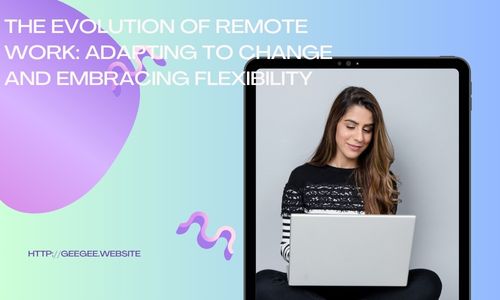This site may contain links to affiliate websites, and I may earn a commission for any purchases made through those links at no additional cost to you.

The Evolution of Remote Work: Adapting to Change and Embracing Flexibility
Navigating the Future of Work in a Hybrid World
The landscape of work has undergone a seismic shift in recent years, driven by technological advancements, evolving employee expectations, and the global pandemic’s lasting impact. As we approach 2025, it is becoming more evident that remote work is not merely a temporary fix but a significant transformation in our professional lives. This blog post explores the future of remote work, highlighting key trends, predictions, and the implications for businesses and employees alike.
The Rise of Hybrid Work Models
One of the most significant trends shaping the future of remote work is the emergence of hybrid work models. A hybrid approach combines remote and in-office work, allowing employees to choose where they work based on their preferences and job requirements. According to recent studies, organizations that embrace hybrid models are likely to see increased employee satisfaction and retention rates.
Flexibility Over Location: As companies recognize the importance of flexibility, the focus will shift from where employees work to when they work. Flexible schedules will become a primary driver of employee satisfaction, enabling individuals to align their work hours with their peak productivity times. This change not only improves employee well-being but also promotes a culture of trust and independence within organizations.
Enhanced Collaboration: While remote work offers numerous advantages, it can sometimes hinder collaboration and team cohesion. Hybrid models address this challenge by facilitating in-person interactions during key meetings or brainstorming sessions while allowing for remote work on other days. Companies like HubSpot are leading the way by implementing successful hybrid strategies that prioritize both flexibility and collaboration.
The Impact of Technology on Remote Work
As we move into 2025, technology will continue to play a pivotal role in shaping remote work experiences. The adoption of advanced tools and platforms will improve communication, collaboration, and productivity within remote teams.
Artificial Intelligence: AI-driven tools will streamline workflows, automate repetitive tasks, and provide valuable insights into employee performance. This technology will empower remote workers to focus on high-value tasks while ensuring that teams remain connected and engaged.
Virtual Reality (VR) and Augmented Reality (AR): These technologies have the potential to revolutionize remote collaboration by creating immersive environments for meetings and training sessions. Imagine attending a virtual conference where you can interact with colleagues as if you were in the same room—this is becoming increasingly feasible as VR and AR technologies advance.
Cybersecurity Measures: With the rise of remote work comes heightened concerns about data security. Organizations will need to invest in robust cybersecurity measures to protect sensitive information and ensure secure communication channels. This includes implementing multi-factor authentication, encryption protocols, and regular training for employees on best practices for data security.
The Shift Toward Employee Well-being
As remote work becomes more entrenched in corporate culture, organizations must prioritize employee well-being to combat potential burnout and disengagement. The pandemic highlighted the importance of mental health, leading many companies to adopt policies that support their employees’ emotional needs.
A vital aspect of this well-being is self-care, which can be enhanced with quality skincare products. For instance, the Anti-X (Anti-Wrinkle) Cream and Natural Blemish Concealer Stick is an excellent addition to your self-care routine. This luxurious cream is USDA certified organic and made with a unique blend of organic botanicals and beehive ingredients that nourish and hydrate the skin, helping to reduce fine lines while providing protection from environmental stressors. Additionally, the Herbal Choice Mari Night Cream offers a rejuvenating solution for nighttime skincare. This 100% organic cream is designed to hydrate and repair your skin as you sleep, ensuring you wake up refreshed and ready to tackle the day ahead. By integrating such products into your daily routine, you can create a more balanced and enjoyable remote work experience, helping you adapt to the changes that come with this evolving work landscape.
Revitalizing Local Economies
Remote work is not only transforming individual workplaces; it is also revitalizing local economies as professionals relocate for better quality of life. Cities like Tulsa have successfully attracted remote workers through innovative programs that offer incentives for relocation.
Economic Growth: As more professionals move to cities with lower living costs or better amenities, local economies benefit from increased spending on housing, food, and services. This trend is expected to continue as cities recognize the potential economic impact of attracting remote talent.
Community Building: Remote workers often seek connections with like-minded individuals in their new communities. Cities that foster networking opportunities through events or coworking spaces can create vibrant ecosystems that support both personal and professional growth.
Challenges Ahead
Despite the many advantages of remote work, several challenges must be addressed as we move into 2025:
Digital Fatigue: With an increase in virtual meetings and digital communication tools, employees may experience digital fatigue—a sense of exhaustion from constant online interactions. Organizations must find ways to balance virtual collaboration with opportunities for face-to-face engagement.
Equity Concerns: As hybrid models become more prevalent, companies must ensure that all employees have equal access to resources and opportunities regardless of their work location. This includes providing necessary technology, training, and support for both remote and in-office workers.
Cultural Integration: Maintaining a strong company culture can be challenging when teams are dispersed across various locations. Organizations need to invest in initiatives that promote inclusivity and engagement among all employees—whether they are working remotely or in-person.
Conclusion
The future of remote work is bright yet complex, characterized by flexibility, technological innovation, and a renewed focus on employee well-being. As we approach 2025, organizations that embrace hybrid models will likely thrive by catering to the diverse needs of their workforce while fostering collaboration and connection.
By prioritizing mental health initiatives, investing in technology that enhances productivity, actively engaging with local communities, and incorporating self-care practices into daily routines through quality products like Anti-X (Anti-Wrinkle) Cream and Herbal Choice Mari Night Cream, companies can navigate the evolving landscape of remote work successfully. As we adapt to these changes together employees seeking balance and organizations striving for excellence—the future holds immense potential for creating fulfilling work experiences that reflect our values and aspirations in this new era of employment.



